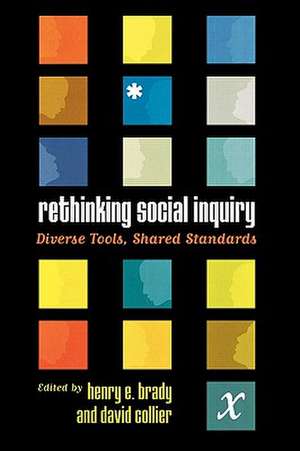Rethinking Social Inquiry
Editat de Henry E. Brady, David Collieren Limba Engleză Paperback – 27 sep 2004
Preț: 353.19 lei
Nou
Puncte Express: 530
Preț estimativ în valută:
67.58€ • 70.75$ • 55.92£
67.58€ • 70.75$ • 55.92£
Carte tipărită la comandă
Livrare economică 02-08 aprilie
Preluare comenzi: 021 569.72.76
Specificații
ISBN-13: 9780742511262
ISBN-10: 074251126X
Pagini: 384
Dimensiuni: 152 x 229 x 22 mm
Greutate: 0.57 kg
Editura: Rowman & Littlefield Publishers, Inc.
ISBN-10: 074251126X
Pagini: 384
Dimensiuni: 152 x 229 x 22 mm
Greutate: 0.57 kg
Editura: Rowman & Littlefield Publishers, Inc.
Notă biografică
Henry E. Brady is Robson Professor of Political Science and Public Policy at the University of California, Berkeley, and director of the Berkeley Survey Research Center. David Collier is professor of political science and a former chair of political science and of Latin American studies at the University of California, Berkeley.
Cuprins
Part 1 I Introduction Chapter 2 1 Refocusing the Discussion of Methodology Chapter 3 2 The Quest for Standards: King, Keohane, and Verba's Designing Social Inquiry Part 4 II Critiques of the Quantitative Template Chapter 5 3 Doing Good and Doing Better: How Far Does a Quantitative Template Get Us? Chapter 6 4 Some Unfulfilled Promises of Quantitative Imperialism Chapter 7 5 How Inference in the Social (but not the Physical) Sciences Neglects Theoretical Anomaly Chapter 8 6 Claiming Too Much: Warnings about Selection Bias Part 9 III Qualitative Tools Chapter 10 7 Tools for Qualitative Research Chapter 11 8 Turning the Tables: How Case-Oriented Research Challenges Variable-Oriented Research Chapter 12 9 Case Studies and the Limits of the Quantitative Worldview Part 13 IV Linking the Quantitative and Qualitative Traditions Chapter 14 10 Bridging the Quantitative-Qualitative Divide Chapter 15 11 The Importance of Research Design Part 16 V Diverse Tools, Shared Standards Chapter 17 12 Critiques, Responses, and Trade-Offs: Drawing Together the Debate Chapter 18 13 Sources of Leverage in Causal Inference: Toward and Alternative View of Methodology Chapter 19 Appendix: Data-Set Observations versus Causal Process Observations: The 2000 U.S. Presidential Election Chapter 20 Glossary
Recenzii
Rethinking Social Inquiry is a breakthrough book. It powerfully makes the case for social inquiry as a rigorous quest for valid causal inference that must exploit to the full the insights and strengths of both statistical and case-based methods. Brady and Collier and their fellow contributors show the pitfalls of mechanically applying dogmas from 'quantitative' or 'qualitative' extremes. Shared standards are possible; and researchers using diverse research designs can work together to build illuminating, empirically grounded theories. All political scientists-indeed all social scientists-should read and reflect on this compelling set of arguments. -- Theda Skocpol, Harvard University I love this book and its pragmatic, ecumenical message. In an era where deep, if artificial, methodological divisions unnecessarily hamstring social research, this book is especially timely. Written by some of the most skilled and innovative methodologists in political science, the individual essays are consistently excellent. But it is the larger message about the need for methodological breadth and variety that will make the book such a valuable teaching tool. -- Douglas McAdam, director, Center for Advanced Study in the Behavioral Sciences, Stanford University The authors display a sophisticated understanding of the diverse strengths and pitfalls of quantitative and qualitative methods of inference within the context of a common commitment to the idea that political science is a scientific enterprise. The essays in this collection ought to be on the reading list of the introductory methods course that all graduate programs offer. -- Michael Wallerstein, Yale University [This] book serves a threefold purpose: it gives an excellent brief overview of the fundamentals of quantitative research, including a critique; it describes in detail tools for qualitative research; it gives a perspective o how to use both to maximize research results. Forum: Qualitative Social Research King, Keohane, and Verba's Designing Social Inquiry aimed at incorporating qualitative research methods into the conceptual framework of quantitative methodology. But was the attempt successful? What is the relationship between qualitative and quantitative methods? In this volume, Brady, Collier, and several other prominent social scientists address these questions in powerful essays. Everyone interested in research methods, and certainly everyone teaching the subject, will want to read this book. -- Christopher H. Achen, Princeton University















